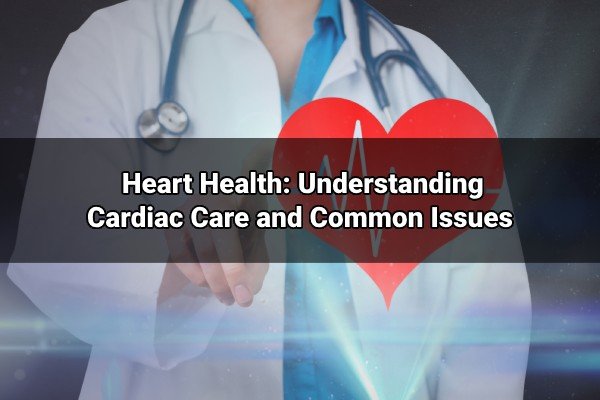Heart health is crucial for a healthy life. Your heart, the body’s engine, keeps you alive by pumping oxygen and nutrients. Neglecting it can lead to heart diseases, which are preventable through a balanced lifestyle. Cardiac care involves maintaining a healthy heart through lifestyle choices, check-ups, and treatments. Heart issues like coronary artery disease, high blood pressure, and irregular heartbeats are common. If you experience symptoms like chest pain or fatigue, seek immediate medical help. Regular check-ups with a cardiac specialist are vital. Let’s explore the significance of heart health and cardiac care together.
Significance of Heart Health
Heart health is a critical component of overall well-being. The heart, a vital organ, pumps oxygen and nutrients throughout the body, sustaining life. Neglecting heart health can lead to serious consequences, including heart disease, heart attacks, and strokes. Fortunately, many heart-related issues are preventable through a combination of a healthy lifestyle, regular exercise, and a balanced diet. Prioritizing heart health not only extends life but also enhances its quality, allowing individuals to enjoy a fuller and more active life with their loved ones.
What is Cardiac Care?
Understanding cardiac care is essential for maintaining a healthy heart and preventing cardiovascular diseases. At its core, cardiac care encompasses a wide range of practices aimed at ensuring the proper functioning of the heart and circulatory system. This includes not only medical treatments but also lifestyle choices and preventive measures.
Cardiovascular diseases, such as coronary artery disease and heart failure, remain leading causes of death globally. Therefore, grasping the fundamentals of cardiac care is crucial for individuals of all ages. Key aspects include recognizing risk factors like age, genetics, and lifestyle choices, as well as understanding the symptoms of heart problems, such as chest pain, shortness of breath, or irregular heartbeats.
Preventive measures form the foundation of cardiac care, including adopting a heart-healthy diet, engaging in regular physical activity, and quitting smoking. Routine check-ups and diagnostic tests like electrocardiograms (ECGs) help monitor heart health, while various treatment options, from medication to surgery, can effectively manage cardiac conditions.
What Are Some Common Cardiac Issues?
Coronary Artery Disease (CAD)
CAD occurs when the blood vessels supplying the heart (coronary arteries) become narrowed or blocked due to the buildup of plaque. This can lead to chest pain (angina) or even heart attacks.
Hypertension (High Blood Pressure)
High blood pressure can strain the heart and blood vessels, increasing the risk of heart disease, stroke, and other cardiovascular problems.
Heart Failure
Heart failure doesn’t mean the heart has stopped working, but rather that it’s weakened and can’t pump blood efficiently. This can cause fatigue, shortness of breath, and fluid retention.
Arrhythmias
Arrhythmias are irregular heart rhythms that can result in palpitations, dizziness, or fainting. Common types include atrial fibrillation and bradycardia.
Symptoms of Cardiac Problems
Chest Pain or Discomfort
Chest pain or discomfort, often described as pressure, squeezing, or a burning sensation, can be a sign and symptoms of angina or a heart attack. It’s a classic symptom that should never be ignored.
Shortness of Breath
Feeling breathless, especially during physical activity or at rest, may indicate heart failure or other heart conditions that affect the pumping ability of the heart.
Fatigue
Unexplained and persistent fatigue can result from reduced blood flow and oxygen supply to the body, often seen in heart conditions like heart failure.
Irregular Heartbeat
An irregular heartbeat, also known as arrhythmia, can manifest as palpitations, skipped beats, or a fluttering sensation. It may be a sign of atrial fibrillation or other arrhythmias.
Dizziness or Fainting
Feeling lightheaded, dizzy, or actually fainting could be due to inadequate blood flow to the brain, which may result from arrhythmias, low blood pressure, or other heart issues.
If you or someone you know experiences these symptoms, especially if they are severe, sudden, or persistent, it’s crucial to seek immediate medical attention. Early diagnosis and treatment can significantly improve the outcomes for many heart-related conditions.
Who Should See a Cardiac Specialist?
Seeing a cardiac specialist is advisable for individuals with various risk factors or symptoms related to heart health. Here are some scenarios in which seeking the expertise of a cardiac specialist is crucial:
Existing Heart Conditions
If you have a diagnosed heart condition like coronary artery disease, heart failure, or arrhythmia, regular consultations with a cardiac specialist are essential to manage and monitor your condition effectively.
Family History
A family history of heart disease can increase your risk. Consulting a cardiac specialist can help assess your genetic predisposition and create a proactive plan for prevention.
Risk Factors
Those with risk factors such as hypertension, high cholesterol, diabetes, smoking habits, obesity, or a sedentary lifestyle should consider cardiac evaluations. Specialists can offer guidance on risk reduction.
Symptoms
Experiencing symptoms like chest pain, shortness of breath, palpitations, or unexplained fatigue warrants prompt consultation with a cardiac specialist to rule out or address potential heart issues.
Preventive Care
Even without symptoms, individuals interested in preventive care and maintaining heart health can benefit from regular check-ups with a cardiac specialist to assess risk factors and develop personalized prevention strategies.
In conclusion, prioritizing heart health is vital for overall well-being, as neglecting it can lead to severe consequences like heart disease and strokes. Cardiac care encompasses lifestyle choices and medical treatments to prevent cardiovascular diseases. Common issues include coronary artery disease, hypertension, heart failure, and arrhythmias. Those with existing conditions, family history, risk factors, or concerning symptoms should consult a cardiac specialist for regular check-ups and early intervention. Immediate medical attention is crucial for symptoms such as chest pain, shortness of breath, fatigue, irregular heartbeat, or dizziness.Some specialized cardiac care hospitals in Pune are providing exceptional care for the heart. As individuals, it is vital to be proactive in seeking appropriate cardiac care and promoting heart health.




